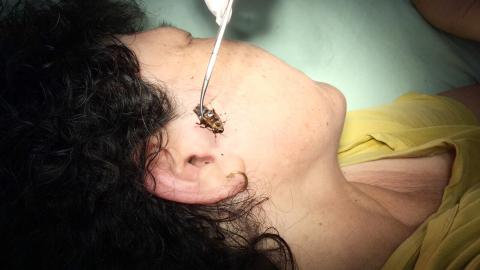People should seek medical help at an otolaryngology clinic if an insect crawls into an ear canal, a doctor at the Ministry of Health and Welfare hospital in Taichung’s Fengyuan District (豐原) said yesterday.
Department of Otolaryngology director Chang Yu-chien (張煜謙) said the hospital recently treated a 60-year-old woman, surnamed Lin (林), after a cockroach crawled into one of her ears.
Lin said she was brushing dirt off an umbrella, but what she thought was a dust ball turned out to be a cockroach, adding that the insect flew into her ear.

Photo courtesy of Fengyuan Hospital
Lin said she initially thought it was another type of insect and asked her children to see if it was possible to get it out, adding that she was able to touch the insect with her fingernails.
After failing to remove the insect, Lin’s children took her to the hospital, where doctors used forceps to remove the bug, which turned out to be a German cockroach about 3cm in length.
“It is very uncommon for cockroaches to crawl into the ear canal,” Chang said, adding that in his 18-year medical career, it was the first time that he had seen such a large cockroach in an ear canal.
Chang said he usually encounters objects in children’s ear canals after they insert them into their ears, or smaller insects such as ants or moths.
If a moth enters the ear canal, people can use the insects’ tendency to move toward light and shine a flashlight down the ear canal, or dab some honey on the outer ear to lure the insect out, Chang said.
People who are afraid that the insects in the ear canal might damage their hearing can drip some oil into the ear to drown the insect before attempting to remove it, he added.
However, the safest and best way is to seek medical help at an otolaryngologist, where doctors would have the proper tools to extract objects in the canal, Chang added.

The Grand Hotel Taipei on Saturday confirmed that its information system had been illegally accessed and expressed its deepest apologies for the concern it has caused its customers, adding that the issue is being investigated by the Ministry of Justice Investigation Bureau. The hotel said that on Tuesday last week, it had discovered an external illegal intrusion into its information system. An initial digital forensic investigation confirmed that parts of the system had been accessed, it said, adding that the possibility that some customer data were stolen and leaked could not be ruled out. The actual scope and content of the affected data

‘LIKE-MINDED PARTNER’: Tako van Popta said it would be inappropriate to delay signing the deal with Taiwan because of China, adding he would promote the issue Canadian senators have stressed Taiwan’s importance for international trade and expressed enthusiasm for ensuring the Taiwan-Canada trade cooperation framework agreement is implemented this year. Representative to Canada Harry Tseng (曾厚仁) in an interview with the Central News Agency (CNA) said he was increasingly uneasy about Ottawa’s delays in signing the agreement, especially as Ottawa has warmed toward Beijing. There are “no negotiations left. Not only [is it] initialed, we have three versions of the text ready: English, French and Mandarin,” Tseng said. “That tells you how close we are to the final signature.” Tseng said that he hoped Canadian Prime Minister Mark Carney

POSITIVE DEVELOPMENT: Japan and the US are expected to hold in-depth discussions on Taiwan-related issues during the meeting next month, Japanese sources said The holding of a Japan-US leaders’ meeting ahead of US President Donald Trump’s visit to China is positive news for Taiwan, former Japan-Taiwan Exchange Association representative Hiroyasu Izumi said yesterday. After the Liberal Democratic Party’s landslide victory in Japan’s House of Representatives election, Japanese Prime Minister Sanae Takaichi is scheduled to visit the US next month, where she is to meet with Trump ahead of the US president’s planned visit to China from March 31 to April 2 for a meeting with Chinese President Xi Jinping (習近平). Japan and the US are expected to hold in-depth discussions on Taiwan-related issues during the

President William Lai (賴清德) yesterday bestowed one of Taiwan’s highest honors on Saint Vincent and the Grenadines (SVG) Ambassador Andrea Clare Bowman in recognition of her contributions to bilateral ties. “By conferring the Order of Brilliant Star with Grand Cordon on Ambassador Bowman today, I want to sincerely thank her, on behalf of the Taiwanese people, for her outstanding contribution to deepening diplomatic ties between Taiwan and SVG,” Lai said at a ceremony held at the Presidential Office in Taipei. He noted that Bowman became SVG’s first ambassador to Taiwan in 2019 and